 Tìm kiếm
Tìm kiếm
Chương II Luật xử lý vi phạm hành chính 2012: Thủ tục lập hồ sơ đề nghị áp dụng các biện pháp xử lý hành chính
| Số hiệu: | 15/2012/QH13 | Loại văn bản: | Luật |
| Nơi ban hành: | Quốc hội | Người ký: | Nguyễn Sinh Hùng |
| Ngày ban hành: | 20/06/2012 | Ngày hiệu lực: | 01/07/2013 |
| Ngày công báo: | 06/08/2012 | Số công báo: | Từ số 479 đến số 480 |
| Lĩnh vực: | Vi phạm hành chính | Tình trạng: | Còn hiệu lực |
TÓM TẮT VĂN BẢN
Điểm mới của Luật xử lý vi phạm hành chính
Ngày 20/6/2012 vừa qua, Quốc hội đã chính thức thông qua Luật xử lý vi phạm hành chính 2012. So với Pháp lệnh xử lý vi phạm hành chính, Luật ra đời có rất nhiều quy định mới, mức xử phạt cũng nặng hơn nhiều so với trước đây.
Theo đó, Luật quy định được phạt cao hơn nhưng tối đa không quá 2 lần mức phạt chung đối với cùng hành vi vi phạm trong 3 lĩnh vực: Giao thông đường bộ; Môi trường; An ninh trật tự, An toàn xã hội, đồng thời chỉ áp dụng tại khu vực nội thành của Thành phố trực thuộc TW. Mức phạt tiền trong xử phạt vi phạm hành chính (VPHC) dao động từ 50 nghìn đồng đến 1 tỷ đồng đối với cá nhân, từ 100 nghìn đồng đến 2 tỷ đồng đối với tổ chức.
Ngoài ra, việc tịch thu tang vật, phương tiện VPHC được áp dụng đối với các VPHC nghiêm trọng do lỗi cố ý của cá nhân, tổ chức. Việc tạm giữ phương tiện, giấy phép, chứng chỉ hành nghề theo thủ tục hành chính chỉ được áp dụng trong trường hợp thật cần thiết và chấm dứt ngay sau khi xác minh được tình tiết làm căn cứ quyết định xử phạt, hành vi vi phạm không còn nguy hiểm cho xã hội.
Bên cạnh đó, Nghị quyết 24/2012/QH13 thi hành Luật này cũng hướng dẫn không áp dụng biện pháp giáo dục tại xã, phường, thị trấn và đưa vào cơ sở chữa bệnh đối với người bán dâm.
Luật xử lý vi phạm hành chính 2012 có hiệu lực kể từ ngày 01/7/2013.
Văn bản tiếng việt
Văn bản tiếng anh
1. Trưởng Công an cấp xã nơi người vi phạm thuộc đối tượng quy định tại Điều 90 của Luật này cư trú hoặc nơi họ có hành vi vi phạm pháp luật tự mình hoặc theo đề nghị của Chủ tịch Uỷ ban Mặt trận Tổ quốc cấp xã hoặc đại diện cơ quan, tổ chức, đơn vị dân cư ở cơ sở lập hồ sơ đề nghị áp dụng biện pháp giáo dục tại xã, phường, thị trấn.
2. Trong trường hợp người vi phạm do cơ quan Công an cấp huyện hoặc Công an cấp tỉnh trực tiếp phát hiện, điều tra, thụ lý trong các vụ vi phạm pháp luật, nhưng chưa đến mức truy cứu trách nhiệm hình sự mà thuộc đối tượng quy định tại Điều 90 của Luật này thì cơ quan Công an đang thụ lý vụ việc tiến hành xác minh, thu thập tài liệu và lập hồ sơ đề nghị áp dụng biện pháp giáo dục tại xã, phường, thị trấn đối với người đó.
3. Hồ sơ đề nghị gồm có bản tóm tắt lý lịch, tài liệu về các hành vi vi phạm pháp luật của người đó, bệnh án (nếu có), bản tường trình của người vi phạm và các tài liệu khác có liên quan.
Đối với người chưa thành niên bị xem xét áp dụng biện pháp giáo dục tại xã, phường, thị trấn thì hồ sơ phải có nhận xét của nhà trường, cơ quan, tổ chức nơi người chưa thành niên đang học tập, làm việc (nếu có), ý kiến của cha mẹ hoặc người giám hộ.
4. Sau khi hoàn thành việc lập hồ sơ đề nghị quy định tại các khoản 1, 2 và 3 Điều này, cơ quan đã lập hồ sơ phải gửi cho Chủ tịch Ủy ban nhân dân cấp xã, đồng thời thông báo cho người bị áp dụng. Đối với người chưa thành niên thì còn được thông báo cho cha mẹ hoặc người giám hộ về việc lập hồ sơ. Những người này có quyền đọc hồ sơ và ghi chép các nội dung cần thiết trong thời hạn 05 ngày, kể từ ngày nhận được thông báo.
1. Trong thời hạn 15 ngày, kể từ ngày nhận được hồ sơ đề nghị áp dụng biện pháp giáo dục tại xã, phường, thị trấn, Chủ tịch Ủy ban nhân dân cấp xã giao công chức tư pháp - hộ tịch kiểm tra hồ sơ và tổ chức cuộc họp tư vấn.
Chủ tịch Ủy ban nhân dân cấp xã chủ trì cuộc họp tư vấn với sự tham gia của Trưởng Công an cấp xã, công chức tư pháp - hộ tịch, đại diện Ủy ban Mặt trận Tổ quốc Việt Nam và một số tổ chức xã hội cùng cấp có liên quan, đại diện dân cư ở cơ sở. Người bị đề nghị áp dụng biện pháp giáo dục tại xã, phường, thị trấn và cha mẹ hoặc người đại diện hợp pháp của họ phải được mời tham gia cuộc họp và phát biểu ý kiến của mình về việc áp dụng biện pháp.
2. Trong thời hạn 03 ngày, kể từ ngày kết thúc cuộc họp tư vấn quy định tại khoản 1 Điều này, Chủ tịch Uỷ ban nhân dân cấp xã xem xét, quyết định áp dụng biện pháp giáo dục tại xã, phường, thị trấn. Tuỳ từng đối tượng mà Chủ tịch Uỷ ban nhân dân cấp xã quyết định giao người được giáo dục cho cơ quan, tổ chức, gia đình quản lý, giáo dục; nếu đối tượng không có nơi cư trú ổn định thì giao cho cơ sở bảo trợ xã hội, cơ sở trợ giúp trẻ em để quản lý, giáo dục.
3. Quyết định áp dụng biện pháp giáo dục tại xã, phường, thị trấn phải ghi rõ ngày, tháng, năm ra quyết định; họ, tên, chức vụ của người ra quyết định; họ, tên, ngày, tháng, năm sinh, nơi cư trú của người được giáo dục; hành vi vi phạm pháp luật của người đó; điều, khoản của văn bản pháp luật được áp dụng; thời hạn áp dụng; ngày thi hành quyết định; trách nhiệm của cơ quan, tổ chức, gia đình được giao giáo dục, quản lý người được giáo dục; quyền khiếu nại, khởi kiện theo quy định của pháp luật.
4. Quyết định áp dụng biện pháp giáo dục tại xã, phường, thị trấn có hiệu lực kể từ ngày ký và phải được gửi ngay cho người được giáo dục, gia đình người đó, Hội đồng nhân dân cấp xã và các cơ quan, tổ chức có liên quan.
5. Hồ sơ về việc áp dụng biện pháp giáo dục tại xã, phường, thị trấn phải được đánh bút lục và được lưu trữ theo quy định của pháp luật về lưu trữ.
1. Việc lập hồ sơ đề nghị áp dụng biện pháp đưa vào trường giáo dưỡng đối với đối tượng quy định tại Điều 92 của Luật này được thực hiện như sau:
a) Đối với người chưa thành niên vi phạm có nơi cư trú ổn định thì Chủ tịch Uỷ ban nhân dân cấp xã nơi người đó cư trú lập hồ sơ đề nghị áp dụng biện pháp đưa vào trường giáo dưỡng.
Hồ sơ đề nghị gồm có bản tóm tắt lý lịch; tài liệu về các hành vi vi phạm pháp luật của người vi phạm; biện pháp giáo dục đã áp dụng; bản tường trình của người vi phạm, ý kiến của cha mẹ hoặc người đại diện hợp pháp của họ, ý kiến của nhà trường, cơ quan, tổ chức nơi người chưa thành niên đang học tập hoặc làm việc (nếu có) và các tài liệu khác có liên quan;
b) Đối với người chưa thành niên vi phạm không có nơi cư trú ổn định thì Chủ tịch Uỷ ban nhân dân cấp xã nơi người đó có hành vi vi phạm pháp luật lập hồ sơ đề nghị áp dụng biện pháp đưa vào trường giáo dưỡng.
Hồ sơ đề nghị gồm có biên bản vi phạm; bản tóm tắt lý lịch; tài liệu về các hành vi vi phạm pháp luật của người đó; bản trích lục tiền án, tiền sự; biện pháp giáo dục đã áp dụng (nếu có); bản tường trình của người vi phạm, ý kiến của cha mẹ hoặc người đại diện hợp pháp của họ;
c) Cơ quan Công an cấp xã có trách nhiệm giúp Chủ tịch Ủy ban nhân dân cùng cấp thu thập các tài liệu và lập hồ sơ đề nghị quy định tại điểm a và điểm b khoản 1 Điều này.
2. Trong trường hợp người chưa thành niên vi phạm do cơ quan Công an cấp huyện hoặc Công an cấp tỉnh trực tiếp phát hiện, điều tra, thụ lý trong các vụ vi phạm pháp luật, nhưng chưa đến mức truy cứu trách nhiệm hình sự mà thuộc đối tượng đưa vào trường giáo dưỡng theo quy định tại Điều 92 của Luật này thì cơ quan Công an đang thụ lý vụ việc tiến hành xác minh, thu thập tài liệu và lập hồ sơ đề nghị áp dụng biện pháp đưa vào trường giáo dưỡng đối với người đó.
Hồ sơ đề nghị gồm có bản tóm tắt lý lịch; tài liệu về các hành vi vi phạm pháp luật của người đó; biện pháp giáo dục đã áp dụng; bản tường trình của người vi phạm, ý kiến của cha mẹ hoặc của người đại diện hợp pháp của họ.
3. Sau khi hoàn thành việc lập hồ sơ đề nghị quy định tại khoản 1 và khoản 2 Điều này, cơ quan đã lập hồ sơ phải thông báo cho người bị đề nghị áp dụng, cha mẹ hoặc người đại diện của họ về việc lập hồ sơ. Những người này có quyền đọc hồ sơ và ghi chép các nội dung cần thiết trong thời hạn 05 ngày, kể từ ngày nhận được thông báo. Sau khi người bị áp dụng, cha mẹ hoặc người đại diện của họ đọc xong hồ sơ thì hồ sơ được gửi cho Trưởng phòng Tư pháp cấp huyện.
Trong thời hạn 05 ngày, kể từ ngày nhận được hồ sơ, Trưởng phòng Tư pháp cấp huyện có trách nhiệm kiểm tra tính pháp lý của hồ sơ và gửi Trưởng công an cùng cấp.
1. Trong thời hạn 07 ngày, kể từ ngày nhận được hồ sơ quy định tại Điều 99 của Luật này, Trưởng Công an cấp huyện xem xét, quyết định việc chuyển hồ sơ đề nghị Tòa án nhân dân cấp huyện áp dụng biện pháp đưa vào trường giáo dưỡng; trường hợp hồ sơ chưa đầy đủ thì chuyển lại cơ quan đã lập hồ sơ để tiếp tục thu thập tài liệu bổ sung hồ sơ.
2. Hồ sơ đề nghị Tòa án nhân dân cấp huyện xem xét, quyết định áp dụng biện pháp đưa vào trường giáo dưỡng bao gồm:
a) Hồ sơ đề nghị áp dụng biện pháp đưa vào trường giáo dưỡng quy định tại Điều 99 của Luật này;
b) Văn bản của Trưởng công an cấp huyện về việc đề nghị xem xét áp dụng biện pháp đưa vào trường giáo dưỡng.
3. Hồ sơ đề nghị áp dụng biện pháp đưa vào trường giáo dưỡng phải được đánh bút lục và được lưu trữ theo quy định của pháp luật về lưu trữ.
1. Việc lập hồ sơ đề nghị áp dụng biện pháp đưa vào cơ sở giáo dục bắt buộc đối với đối tượng quy định tại Điều 94 của Luật này được thực hiện như sau:
a) Đối với người vi phạm có nơi cư trú ổn định thì Chủ tịch Uỷ ban nhân dân cấp xã nơi người đó cư trú lập hồ sơ đề nghị áp dụng biện pháp đưa vào cơ sở giáo dục bắt buộc.
Hồ sơ đề nghị gồm có bản tóm tắt lý lịch; tài liệu về các hành vi vi phạm pháp luật của người đó; biện pháp giáo dục tại xã, phường, thị trấn đã áp dụng; bản tường trình của người vi phạm hoặc của người đại diện hợp pháp của họ và các tài liệu khác có liên quan;
b) Đối với người không cư trú tại nơi có hành vi vi phạm pháp luật thì Chủ tịch Ủy ban nhân dân cấp xã phải xác minh; trường hợp xác định được nơi cư trú thì có trách nhiệm chuyển người đó kèm theo biên bản vi phạm về địa phương để xử lý; trường hợp không xác định được nơi cư trú của người đó thì lập hồ sơ đề nghị áp dụng biện pháp đưa vào cơ sở giáo dục bắt buộc.
Hồ sơ đề nghị gồm có biên bản vi phạm; bản tóm tắt lý lịch; tài liệu về các hành vi vi phạm pháp luật của người đó; bản trích lục tiền án, tiền sự; biện pháp giáo dục đã áp dụng (nếu có); bản tường trình của người vi phạm hoặc của người đại diện hợp pháp của họ;
c) Công an cấp xã có trách nhiệm giúp Chủ tịch Ủy ban nhân dân cùng cấp thu thập các tài liệu và lập hồ sơ đề nghị quy định tại điểm a và điểm b khoản 1 Điều này.
2. Trường hợp người vi phạm do cơ quan Công an cấp huyện hoặc Công an cấp tỉnh trực tiếp phát hiện, điều tra, thụ lý trong các vụ vi phạm pháp luật, nhưng chưa đến mức truy cứu trách nhiệm hình sự mà thuộc đối tượng đưa vào cơ sở giáo dục bắt buộc theo quy định tại Điều 94 của Luật này thì cơ quan Công an đang thụ lý vụ việc tiến hành xác minh, thu thập tài liệu và lập hồ sơ đề nghị áp dụng biện pháp đưa vào cơ sở giáo dục bắt buộc đối với người đó.
Hồ sơ đề nghị gồm có bản tóm tắt lý lịch; tài liệu về các hành vi vi phạm pháp luật của người đó; biện pháp giáo dục tại xã, phường, thị trấn đã áp dụng; bản tường trình của người vi phạm hoặc của người đại diện hợp pháp của họ.
3. Sau khi hoàn thành việc lập hồ sơ đề nghị quy định tại khoản 1 và khoản 2 Điều này, cơ quan đã lập hồ sơ phải thông báo cho người bị đề nghị áp dụng hoặc người đại diện của họ về việc lập hồ sơ. Những người này được quyền đọc hồ sơ và ghi chép các nội dung cần thiết trong thời hạn 05 ngày, kể từ ngày nhận được thông báo. Sau khi người bị áp dụng hoặc người đại diện của họ đọc xong hồ sơ thì hồ sơ được gửi cho Trưởng phòng Tư pháp cấp huyện.
Trong thời hạn 05 ngày, kể từ ngày nhận được hồ sơ, Trưởng phòng Tư pháp cấp huyện có trách nhiệm kiểm tra tính pháp lý của hồ sơ và chuyển Trưởng Công an cùng cấp.
1. Trong thời hạn 07 ngày, kể từ ngày nhận được hồ sơ quy định tại Điều 101 và Điều 118 của Luật này, Trưởng Công an cấp huyện quyết định việc chuyển hồ sơ đề nghị Tòa án nhân dân cấp huyện áp dụng biện pháp đưa vào cơ sở giáo dục bắt buộc; trường hợp hồ sơ chưa đầy đủ thì chuyển lại cơ quan đã lập hồ sơ tiếp tục thu thập tài liệu bổ sung hồ sơ.
2. Hồ sơ đề nghị Tòa án nhân dân cấp huyện xem xét, quyết định áp dụng biện pháp đưa vào cơ sở giáo dục bắt buộc bao gồm:
a) Hồ sơ đề nghị áp dụng biện pháp đưa vào cơ sở giáo dục bắt buộc quy định tại Điều 101 và Điều 118 của Luật này;
b) Văn bản của Trưởng Công an cấp huyện về việc đề nghị xem xét áp dụng biện pháp đưa vào cơ sở giáo dục bắt buộc.
3. Hồ sơ đề nghị áp dụng biện pháp đưa vào cơ sở giáo dục bắt buộc phải được đánh bút lục và được lưu trữ theo quy định của pháp luật về lưu trữ.
1. Việc lập hồ sơ đề nghị áp dụng biện pháp đưa vào cơ sở cai nghiện bắt buộc đối với người nghiện ma túy quy định tại Điều 96 của Luật này được thực hiện như sau:
a) Đối với người nghiện ma túy có nơi cư trú ổn định thì Chủ tịch Uỷ ban nhân dân cấp xã nơi người đó cư trú lập hồ sơ đề nghị áp dụng biện pháp đưa vào cơ sở cai nghiện bắt buộc.
Hồ sơ đề nghị gồm có bản tóm tắt lý lịch; tài liệu chứng minh tình trạng nghiện ma túy hiện tại của người đó; tài liệu chứng minh người đó đã bị áp dụng biện pháp giáo dục tại xã, phường, thị trấn về hành vi nghiện ma túy; bản tường trình của người vi phạm hoặc của người đại diện hợp pháp của họ và các tài liệu khác có liên quan;
b) Đối với người nghiện ma túy không cư trú tại nơi người đó có hành vi vi phạm pháp luật thì Chủ tịch Ủy ban nhân dân cấp xã phải xác minh; trường hợp xác định được nơi cư trú thì có trách nhiệm chuyển người đó kèm theo biên bản vi phạm về địa phương để xử lý; trường hợp không xác định được nơi cư trú của người đó thì lập hồ sơ đề nghị áp dụng biện pháp đưa vào cơ sở cai nghiện bắt buộc.
Hồ sơ đề nghị gồm có biên bản vi phạm; bản tóm tắt lý lịch; tài liệu chứng minh tình trạng nghiện ma túy hiện tại của người đó; tài liệu chứng minh người đó đã bị áp dụng biện pháp giáo dục tại xã, phường, thị trấn về hành vi nghiện ma túy; bản tường trình của người nghiện ma túy;
c) Công an cấp xã có trách nhiệm giúp Chủ tịch Ủy ban nhân dân cùng cấp thu thập các tài liệu và lập hồ sơ đề nghị quy định tại khoản 1 và khoản 2 Điều này.
2. Trường hợp người nghiện ma túy vi phạm do cơ quan Công an cấp huyện hoặc cơ quan Công an cấp tỉnh trực tiếp phát hiện, điều tra, thụ lý trong các vụ vi phạm pháp luật mà thuộc đối tượng đưa vào cơ sở cai nghiện bắt buộc theo quy định tại Điều 96 của Luật này thì cơ quan Công an đang thụ lý vụ việc tiến hành xác minh, thu thập tài liệu và lập hồ sơ đề nghị áp dụng biện pháp đưa vào cơ sở cai nghiện bắt buộc đối với người đó.
Hồ sơ đề nghị gồm có bản tóm tắt lý lịch; tài liệu chứng minh tình trạng nghiện ma túy hiện tại của người đó; tài liệu chứng minh người đó đã bị áp dụng biện pháp giáo dục tại xã, phường, thị trấn về hành vi nghiện ma túy; bản tường trình của người vi phạm hoặc của người đại diện hợp pháp của họ.
3. Sau khi hoàn thành việc lập hồ sơ đề nghị quy định tại khoản 1 và khoản 2 Điều này, cơ quan đã lập hồ sơ phải thông báo cho người bị đề nghị áp dụng hoặc người đại diện của họ về việc lập hồ sơ. Những người này có quyền đọc hồ sơ và ghi chép các nội dung cần thiết trong thời hạn 05 ngày, kể từ ngày nhận được thông báo. Sau khi người bị áp dụng hoặc người đại diện hợp pháp của họ đọc xong hồ sơ thì hồ sơ được gửi cho Trưởng phòng Tư pháp cấp huyện.
Trong thời hạn 05 ngày, kể từ ngày nhận được hồ sơ, Trưởng phòng Tư pháp cấp huyện có trách nhiệm kiểm tra tính pháp lý của hồ sơ gửi Trưởng phòng Lao động - Thương binh và Xã hội cùng cấp.
1. Trong thời hạn 07 ngày, kể từ ngày nhận được hồ sơ quy định tại Điều 103 của Luật này, Trưởng phòng Lao động - Thương binh và Xã hội cấp huyện quyết định việc chuyển hồ sơ đề nghị Tòa án nhân dân cấp huyện áp dụng biện pháp đưa vào cơ sở cai nghiện bắt buộc; trường hợp hồ sơ chưa đầy đủ thì giao cơ quan đã lập hồ sơ để tiếp tục thu thập tài liệu bổ sung hồ sơ.
2. Hồ sơ đề nghị Tòa án nhân dân cấp huyện xem xét, quyết định áp dụng biện pháp đưa vào cơ sở cai nghiện bắt buộc bao gồm:
a) Hồ sơ đề nghị áp dụng biện pháp đưa vào cơ sở cai nghiện bắt buộc quy định tại Điều 103 của Luật này;
b) Văn bản của Trưởng phòng Lao động - Thương binh và Xã hội cấp huyện về việc đề nghị xem xét áp dụng biện pháp đưa vào cơ sở cai nghiện bắt buộc.
3. Hồ sơ đề nghị áp dụng biện pháp đưa vào cơ sở cai nghiện bắt buộc phải được đánh bút lục và được lưu trữ theo quy định của pháp luật về lưu trữ.
PROCEDURES FOR COMPILATION OF DOSSIERS PROPOSING TO APPLY ADMINISTRATIVE HANDLING MEASURES
Article 97. Compilation of dossier proposing to apply measure of education at communes, wards, district towns
1. The commune-level police chiefs of place where the violators are subjects specified in Article 90 of this Law are resident or place where they have acts violating law, shall decide on application of measure of education at communes, wards or district townships on their own or at the request of The commune-level Fatherland Front Committee presidents or representatives of agencies, organizations, residential units at grassroots.
2. In case the violators are directly detected, investigated, handled by district Police agencies or provincial Police in cases of violating law, but not liable to criminal prosecutions and in subjects specified in Article 90 of this Law, the Police agencies
3. Application dossier comprises curriculum vitae, the documents on law offenses committed by such person, medical record (if any), statement of violator and other related documents.
For minors who are considered to apply measure of education at communes, wards, district towns, the dossier must have remarks of schools, agencies, organizations where minors studying, working (if any), comments of his/her parents or guardian.
4. After finishing the application dossier specified in clauses 1,2 and 3 of this Article, agencies have made dossiers must send them to commune-level the Presidents of the People’s Committee, and notify to person subject to such application. For minors, compilation of such dossiers shall be notified to his/her parents or guardian. These persons are entitled to read dossier and take necessary content record within 05 days, after receiving notification.
Article 98. Decision on application of measure of education at communes, wards, district towns
1. Within 15 days, after receiving dossier proposing for application of measure of education at communes, wards, district towns, the commune-level Presidents of the People’s Committee assign civil status-judicial officer to examine dossier and organize a consulting meeting.
The commune-level President of the People’s Committee shall assume the prime responsibility for the consulting meeting with participation of chieft of commune-level police officer, civil status-judicial officer, the representatives of Fatherland Front Committee and some relevant social organizations at same level, local residents. The person subject to application of measure of education at communes, wards, district towns and his/her parents or guardian must be invited to take part in the meeting and express their opinions on measure application.
2. Within 03 days, after ending the consulting meeting specified in clause 1 of this Article, the commune-level Presidents of the People’s Committee shall consider to decide application of measure of education at communes, wards, and district towns. Depending on each subjects, the commune-level Presidents of the People’s Committee shall decide on handing the persons need be educated to agencies, organizations, their family for management and education; in case subjects have no stable residence, the social relief establishments or children assistance establishments shall be handed for management and education.
3. Decision on application of measure on education at communes, wards, district towns must clearly state the dates of issuance; the full name and positions of the decision issuers; the full names, date of birth and residence of the persons subject to education , the acts of law violation committed by such persons; clauses of legal documents to be applied, places where the violations are committed; the time limits for application, the date of execution; duties of agencies, organizations,family handed for education, management of persons subject to education ; rights to complaint, initiate lawsuits as prescribed by law.
4. The decision on application of measure of education at communes, wards, district towns shall take effect since day of signing and must be immediately sent to the persons subject to education , his/her family, the commune-level People’s Council and relevant agencies, organizations.
5. Dossiers of application of measure of Education at communes, wards, district towns must be filled in book of records and archived as prescribed by law on archive.
Article 99. Compilation of dossier proposing for application of measure sending to reformatories
1. Compilation of dossier proposing for application of measure sending to reformatories with respect to subjects specified in Article 92 of this Law shall be performed as follows:
a) For violators being minors with stable residence, the commune-level president of People’s Committee where such persons being resident, shall compile dossier proposing for application of measure sending to reformatories.
The proposal dossier comprises curriculum vitae, the documents on law offenses committed by violator, education measures have been applied; statement of violator, comments of his/her parents or legal representatives, comments of school, agency, organization where the minor studying or working (if any) and other related documents;
b) For violators being minors without stable residence, the commune-level president of People’s Committee where such persons committing acts violating law, shall compile dossier proposing for application of measure sending to reformatories.
The proposal dossier comprises record of offenses; curriculum vitae; documents on law offenses committed by violator, the extracts of previous judgments, previous incidents; education measures have been applied (if any); statement of violator, comments of his/her parents or legal representatives;
c) The commune-level police office shall help the President of the People’s Committee at same level to collect documents and compile the proposing dossier specified in point a and point b clause 1 of this Article.
2. In case the violator being minor who is directly detected, investigated, handled by district or provincial-level Police in cases of violating law, but not liable to criminal prosecutions and in subjects specified sending to reformatories as prescribed in Article 92 of this Law, the Police agency handling cases shall verify, gather documents and compile dossier proposing for application of measure sending to reformatories with respect to such person.
The proposal dossier comprises curriculum vitae; documents on law offenses committed by violator, education measures have been applied, statement of violator, comments of his/her parents or legal representatives;
3. After finishing the proposing dossier compilation specified in clauses 1 and 2 of this Article, agencies have made dossiers must notify to person being proposed for application, his/her parents or legal representatives about dossier compilation. These persons are entitled to read dossier and take necessary content record within 05 days, after receiving notification. After the applied person, his/her parents or legal representatives have read dossier, dossier shall be sent to the head of district-level Justice division.
Within 05 days, after receiving dossier, the head of district-level Justice Division shall examine legality of dossier and send it to the police head at same level.
Article 100. Consideration, decision for transferring dossier and proposing the district-level People’s Court for application of measure sending to reformatories
1. Within 07 days, after receiving dossier specified in Article 99 of this Law, the district-level Police head shall consider and decide on transferring dossier to suggest the district-level People’s Court to apply measure sending to reformatories; if dossier is not sufficient, it shall be re-transferred to agency having compiled to continue gathering documents for supplement of dossier.
2. The dossier proposing the district-level People’s Court for consideration and decision on application of measure sending to reformatories comprises:
a) Dossier proposing for application of measure sending to reformatories specified in Article 99 of this Law;
b) A written document of the district-level Police head on proposing for consideration on application of measure sending to reformatories.
3. Dossiers proposing application of measure sending to reformatories must be filled in book of records and archived as prescribed by law on archive.
Article 101. Compilation of dossier proposing application of measure sending to compulsory education establishments
1. Compilation of dossier proposing for application of measure sending to compulsory education establishments with respect to subjects specified in Article 94 of this Law shall be performed as follows:
a) For violators with stable residence, the commune-level president of People’s Committee where such persons being resident, shall compile dossier proposing for application of measure sending to compulsory education establishment.
The proposal dossier comprises curriculum vitae; documents on law offenses committed by violator, education measures have been applied, statement of violator or his/her legal representatives and other related documents;
b) For persons who are not resident in place acts of law violation have been committed, the commune-level President of the People’s Committee must verify; if residence is defined, such persons shall be transfer enclosed with violation record to his/her local for handling; if residence is not defined, such persons shall be compiled dossier proposing application of measure sending to compulsory education establishment.
The proposal dossier comprises record of offenses; curriculum vitae; documents on law offenses committed by violator, the extracts of previous judgments, previous incidents; education measures have beed applied (if any); statement of violator or his/her legal representatives;
c) The commune-level police office shall help the President of the People’s Committee at same level to gather documents and compile the proposing dossier specified in point a and point b clause 1 of this Article.
2. In case the violator being directly detected, investigated, handled by district or provincial-level Police in cases of violating law, but not liable to criminal prosecutions and in subjects spending to compulsory education establishments as prescribed in Article 94 of this Law, the Police agency handling cases shall verify, gather documents and compile dossier proposing for application of measure sending to compulsory education establishments with respect to such person.
The proposal dossier comprises curriculum vitae; documents on law offenses committed by violator, education measures have been applied, statement of violator or his/her legal representatives;
3. After finishing the proposing-dossier compilation specified in clauses 1 and 2 of this Article, agency has made dossiers must notify to person being proposed for application or legal representatives about dossier compilation. These persons are entitled to read dossier and take necessary content record within 05 days, after receiving notification. After the apllied persons or their representatives have read dossier, dossier shall be send to the head of district-level Justice division.
Within 05 days, after receiving dossier, the head of district-level Justice Division shall examine legality of dossier and send it to the police head at same level.
Article 102. Consideration, decision for transferring dossier and proposing the district-level People’s Court for application of measure sending to compulsory education establishments
1. Within 07 days, after receiving dossier specified in Article 101 and 118 of this Law, the district-level Police head shall decide on transferring dossier to suggest the district-level People’s Court to apply measure sending to compulsory education establishment; if dossier is not sufficient, it shall be re-transferred to agency having compiled to continue gathering documents for supplement of dossier.
2. The dossier proposing the district-level People’s Court for consideration and decision on application of measure sending to compulsory education establishments comprises:
a) Dossier proposing for application of measure sending to compulsory education establishments specified in Article 101 and 118 of this Law;
b) A written document of the district-level Police head on proposing for consideration on application of measure sending to compulsory education establishment.
3. Dossiers proposing application of measure sending to compulsory education establishments must be filled in book of records and archived as prescribed by law on archive.
Article 103. Compilation of dossier proposing application of measure sending to compulsory detoxification establishments
1. Compilation of dossier proposing for application of measure sending to compulsory detoxification establishments with respect to drug addicts specified in Article 96 of this Law shall be performed as follows:
a) For drug addicts with stable residence, the commune-level president of People’s Committee where such persons being resident, shall compile dossier proposing for application of measure sending to compulsory detoxification establishment.
The proposal dossier comprises curriculum vitae; documents proving the current drug addiction of such person, documents proving such person have been applied measure of education at communes, wards, district towns on act of drug addiction, statement of the violator or legal representatives and other related documents;
b) For drug addicts who are not resident in place acts of law violation have been committed by them, the commune-level President of People’s Committee must verify; if residence is defined, such persons shall be transfer enclosed with violation record to his/her local for handling; if residence is not defined, such persons shall be compiled dossier proposing application of measure sending to compulsory detoxification establishment.
The proposal dossier comprises violation record, curriculum vitae; documents proving the current drug addiction of such person, documents proving such person have been applied measure of education at communes, wards, district towns on act of drug addiction, statement of the drug addicts;
c) The commune-level police office shall help the President of the People’s Committee at same level to gather documents and compile the proposing dossier specified in clause 1 and clause 2 of this Article.
2. In case the violating drug addicts who is directly detected, investigated, handled by district or provincial-level Police in cases of violating law, are subjects sending to compulsory detoxification establishments as prescribed in Article 96 of this Law, the Police agency handling cases shall verify, gather documents and compile dossier proposing for application of measure sending to compulsory detoxification establishments with respect to such person.
The proposal dossier comprises curriculum vitae; documents proving the current drug addiction of such person, documents proving such person have been applied measure of education at communes, wards, district towns on act of drug addiction, statement of the violator or legal representatives;
3. After finishing the proposing-dossier compilation specified in clauses 1 and 2 of this Article, agency has made dossiers must notify to person being proposed for application or his/her legal representatives about dossier compilation. These persons are entitled to read dossier and take necessary content record within 05 days, after receiving notification. After the applied person or his/her legal representatives have read dossier, dossier shall be sent to the head of district-level Justice division.
Within 05 days, after receiving dossier, the head of district-level Justice Division shall examine legality of dossier and send it to the head of Labour, War Invalids and Social Affairs division at same level.
Article 104. Consideration, decision for transferring dossier and proposing the district-level People’s Court for application of measure sending to compulsory detoxification establishments
1. Within 07 days, after receiving dossier specified in Article 103 of this Law, the head of Labour, War Invalids and Social Affairs division shall decide on transferring dossier to suggest the district-level People’s Court to apply measure sending to compulsory detoxification establishment; if dossier is not sufficient, it shall be re-turned to agency having compiled to continue gathering documents for supplement of dossier.
2. The dossier proposing the district-level People’s Court for consideration and decision on application of measure sending to compulsory detoxification establishments comprises:
a) Dossier proposing for application of measure sending to compulsory detoxification establishments specified in Article 103 of this Law;
b) A written document of the head of Labour, War Invalids and Social Affairs division on proposing for consideration on application of measure sending to compulsory detoxification establishment.
3. Dossiers proposing application of measure sending to compulsory detoxification establishments must be filled in book of records and archived as prescribed by law on archive.
Văn bản liên quan
Cập nhật
Điều 3. Nguyên tắc xử lý vi phạm hành chính
Điều 6. Thời hiệu xử lý vi phạm hành chính
Điều 12. Những hành vi bị nghiêm cấm
Điều 17. Trách nhiệm quản lý công tác thi hành pháp luật về xử lý vi phạm hành chính
Điều 18. Trách nhiệm của thủ trưởng cơ quan, đơn vị trong công tác xử lý vi phạm hành chính
Điều 21. Các hình thức xử phạt và nguyên tắc áp dụng
Điều 24. Mức phạt tiền tối đa trong các lĩnh vực
Điều 26. Tịch thu tang vật, phương tiện vi phạm hành chính
Điều 28. Các biện pháp khắc phục hậu quả và nguyên tắc áp dụng
Điều 38. Thẩm quyền của Chủ tịch Ủy ban nhân dân
Điều 39. Thẩm quyền của Công an nhân dân
Điều 40. Thẩm quyền của Bộ đội biên phòng
Điều 41. Thẩm quyền của Cảnh sát biển
Điều 43. Thẩm quyền của Kiểm lâm
Điều 44. Thẩm quyền của cơ quan Thuế
Điều 45. Thẩm quyền của Quản lý thị trường
Điều 46. Thẩm quyền của Thanh tra
Điều 47. Thẩm quyền của Cảng vụ hàng hải, Cảng vụ hàng không, Cảng vụ đường thuỷ nội địa
Điều 48. Thẩm quyền của Toà án nhân dân
Điều 49. Thẩm quyền của cơ quan thi hành án dân sự
Điều 62. Chuyển hồ sơ vụ vi phạm có dấu hiệu tội phạm để truy cứu trách nhiệm hình sự
Điều 63. Chuyển hồ sơ vụ vi phạm để xử phạt hành chính
Điều 65. Những trường hợp không ra quyết định xử phạt vi phạm hành chính
Điều 68. Nội dung quyết định xử phạt vi phạm hành chính
Điều 71. Chuyển quyết định xử phạt để tổ chức thi hành
Điều 74. Thời hiệu thi hành quyết định xử phạt vi phạm hành chính
Điều 78. Thủ tục nộp tiền phạt
Điều 79. Nộp tiền phạt nhiều lần
Điều 81. Thủ tục tịch thu tang vật, phương tiện vi phạm hành chính
Điều 86. Cưỡng chế thi hành quyết định xử phạt vi phạm hành chính
Điều 88. Thi hành quyết định cưỡng chế
Điều 94. Đối tượng áp dụng biện pháp đưa vào cơ sở giáo dục bắt buộc
Điều 96. Đối tượng áp dụng biện pháp đưa vào cơ sở cai nghiện bắt buộc
Điều 97. Lập hồ sơ đề nghị áp dụng biện pháp giáo dục tại xã, phường, thị trấn
Điều 98. Quyết định áp dụng biện pháp giáo dục tại xã, phường, thị trấn
Điều 99. Lập hồ sơ đề nghị áp dụng biện pháp đưa vào trường giáo dưỡng
Điều 101. Lập hồ sơ đề nghị áp dụng biện pháp đưa vào cơ sở giáo dục bắt buộc
Điều 103. Lập hồ sơ đề nghị áp dụng biện pháp đưa vào cơ sở cai nghiện bắt buộc
Điều 122. Tạm giữ người theo thủ tục hành chính
Điều 123. Thẩm quyền tạm giữ người theo thủ tục hành chính
Điều 124. Áp giải người vi phạm
Điều 125. Tạm giữ tang vật, phương tiện, giấy phép, chứng chỉ hành nghề theo thủ tục hành chính
Điều 128. Khám phương tiện vận tải, đồ vật theo thủ tục hành chính
Điều 129. Khám nơi cất giấu tang vật, phương tiện vi phạm hành chính
Điều 5. Đối tượng bị xử lý vi phạm hành chính
Điều 18. Trách nhiệm của thủ trưởng cơ quan, đơn vị trong công tác xử lý vi phạm hành chính
Điều 66. Thời hạn ra quyết định xử phạt vi phạm hành chính
Điều 125. Tạm giữ tang vật, phương tiện, giấy phép, chứng chỉ hành nghề theo thủ tục hành chính
Điều 128. Khám phương tiện vận tải, đồ vật theo thủ tục hành chính
Điều 3. Nguyên tắc xử lý vi phạm hành chính
Điều 5. Đối tượng bị xử lý vi phạm hành chính
Điều 18. Trách nhiệm của thủ trưởng cơ quan, đơn vị trong công tác xử lý vi phạm hành chính
Điều 28. Các biện pháp khắc phục hậu quả và nguyên tắc áp dụng
Điều 46. Thẩm quyền của Thanh tra
Điều 83. Quản lý tiền thu từ xử phạt vi phạm hành chính, chứng từ thu, nộp tiền phạt
Điều 5. Đối tượng bị xử lý vi phạm hành chính
Điều 21. Các hình thức xử phạt và nguyên tắc áp dụng
Điều 97. Lập hồ sơ đề nghị áp dụng biện pháp giáo dục tại xã, phường, thị trấn
Điều 99. Lập hồ sơ đề nghị áp dụng biện pháp đưa vào trường giáo dưỡng
Điều 101. Lập hồ sơ đề nghị áp dụng biện pháp đưa vào cơ sở giáo dục bắt buộc
Bài viết liên quan
Nồng độ cồn xe máy bao nhiêu thì không bị phạt mới nhất 2025?

Nồng độ cồn xe máy bao nhiêu thì không bị phạt mới nhất 2025?
Nồng độ cồn bao nhiêu khi lái xe máy thì không bị phạt? Đây là câu hỏi nhiều người thắc mắc khi tham gia giao thông sau khi uống rượu bia. Bài viết này sẽ cung cấp thông tin chi tiết về mức nồng độ cồn cho phép theo quy định pháp luật Việt Nam hiện hành, giúp bạn hiểu rõ và tránh vi phạm khi điều khiển phương tiện. 21/01/2025Nồng độ cồn bao nhiêu thì bị phạt vi phạm giao thông mới nhất 2025?

Nồng độ cồn bao nhiêu thì bị phạt vi phạm giao thông mới nhất 2025?
Nồng độ cồn bao nhiêu thì bị phạt vi phạm giao thông? Đây là câu hỏi được nhiều người quan tâm, đặc biệt khi các quy định xử phạt vi phạm nồng độ cồn ngày càng nghiêm ngặt. Bài viết này sẽ cung cấp thông tin chi tiết về mức nồng độ cồn cho phép, các mức xử phạt tương ứng và những lưu ý quan trọng để bạn tham gia giao thông an toàn và đúng luật. 21/01/2025Nồng độ cồn là gì? Có nồng độ cồn dưới ngưỡng vi phạm thì có bị phạt không mới nhất 2025?

Nồng độ cồn là gì? Có nồng độ cồn dưới ngưỡng vi phạm thì có bị phạt không mới nhất 2025?
Nồng độ cồn là gì? Có nồng độ cồn dưới ngưỡng vi phạm thì có bị phạt không? Đây là câu hỏi mà nhiều người tham gia giao thông quan tâm. Bài viết này sẽ giải thích rõ khái niệm nồng độ cồn, quy định pháp luật hiện hành và mức xử phạt khi điều khiển phương tiện giao thông có nồng độ cồn dưới ngưỡng quy định. Cùng tìm hiểu để lái xe an toàn và đúng pháp luật! 21/01/2025Uống rượu bia mà nồng độ cồn 0,096 miligam/1 lít khí thở khi lái xe máy tham gia giao thông sẽ bị xử phạt thế nào mới nhất 2025?
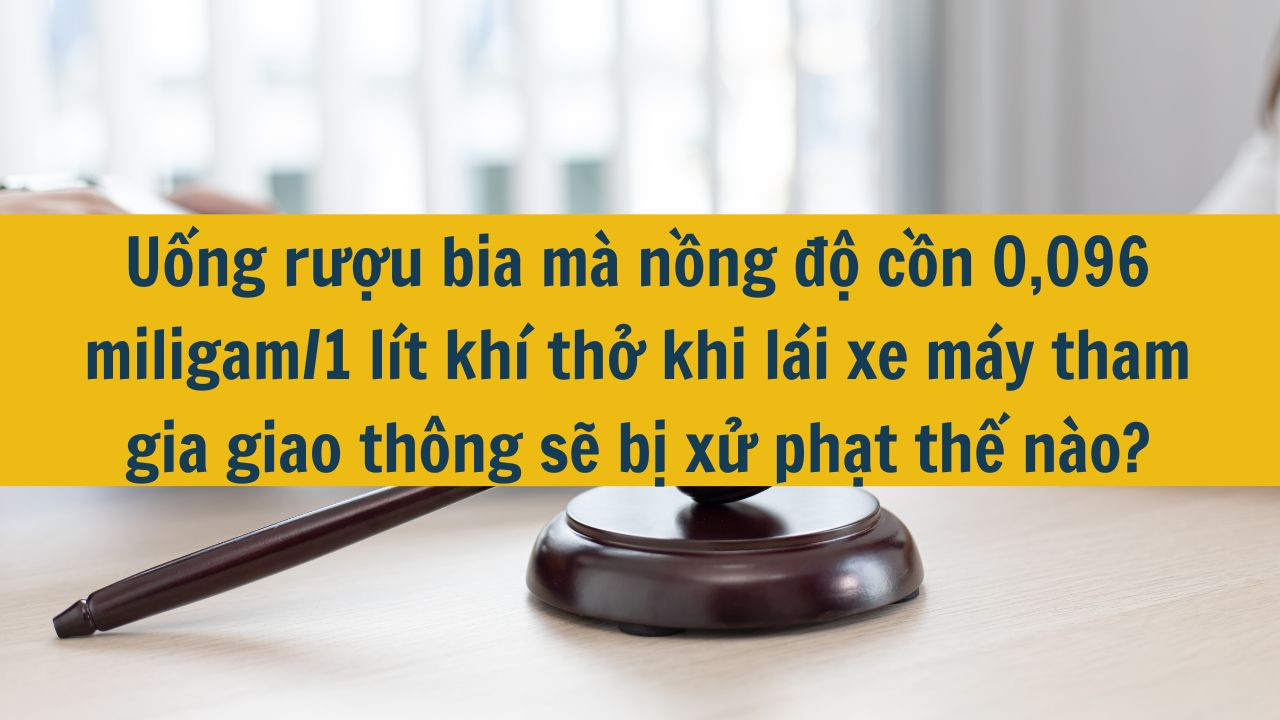
Uống rượu bia mà nồng độ cồn 0,096 miligam/1 lít khí thở khi lái xe máy tham gia giao thông sẽ bị xử phạt thế nào mới nhất 2025?
Việc điều khiển xe máy khi trong hơi thở có nồng độ cồn 0,096 miligam/lít khí thở vi phạm quy định pháp luật về an toàn giao thông đường bộ. Vậy với mức vi phạm này, người lái xe sẽ bị xử phạt như thế nào? Bài viết dưới đây sẽ cung cấp thông tin chi tiết về mức phạt, các hình thức xử lý và những lưu ý quan trọng mà người tham gia giao thông cần biết. 21/01/2025Quy định nào cấm lái xe khi đã uống rượu bia mới nhất 2025?

Quy định nào cấm lái xe khi đã uống rượu bia mới nhất 2025?
Lái xe sau khi uống rượu bia là hành vi bị pháp luật nghiêm cấm nhằm đảm bảo an toàn giao thông và tính mạng con người. Vậy quy định cụ thể nào cấm lái xe khi đã sử dụng rượu bia? Mức xử phạt đối với người vi phạm ra sao? Hãy cùng tìm hiểu chi tiết trong bài viết dưới đây để nắm rõ quy định và tránh những hậu quả đáng tiếc 21/01/2025Uống rượu bia bao nhiêu thì sẽ không bị phạt khi lái xe máy tham gia giao thông? Hay tất cả trường hợp có uống rượu bia đều bị phạt mới nhất 2025?

Uống rượu bia bao nhiêu thì sẽ không bị phạt khi lái xe máy tham gia giao thông? Hay tất cả trường hợp có uống rượu bia đều bị phạt mới nhất 2025?
Uống rượu bia bao nhiêu thì không bị phạt khi lái xe máy? Đây là câu hỏi được nhiều người quan tâm khi tham gia giao thông. Theo quy định pháp luật hiện hành, liệu có ngưỡng nồng độ cồn an toàn hay mọi trường hợp sử dụng rượu bia đều bị xử phạt? Bài viết này sẽ giải đáp chi tiết và cập nhật những quy định mới nhất về nồng độ cồn đối với người điều khiển xe máy. 06/01/2025Nồng độ cồn 0.53 phạt bao nhiêu tiền mới nhất 2025?
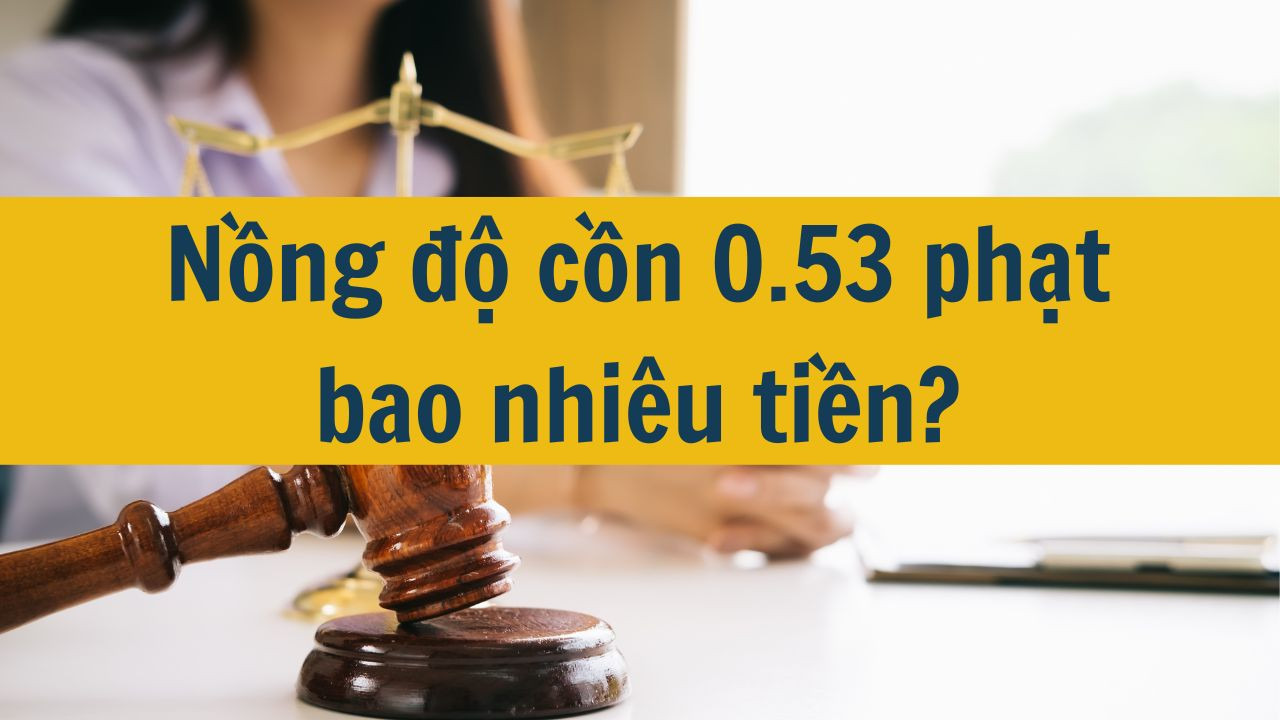
Nồng độ cồn 0.53 phạt bao nhiêu tiền mới nhất 2025?
Nồng độ cồn 0.53 là mức vi phạm phổ biến khi tham gia giao thông. Tuy nhiên, mức phạt đối với vi phạm này sẽ phụ thuộc vào các quy định hiện hành của pháp luật. Trong bài viết này, chúng tôi sẽ cung cấp thông tin chi tiết về mức phạt khi bị phát hiện vi phạm nồng độ cồn 0.53, giúp bạn hiểu rõ hơn về các hình thức xử lý vi phạm giao thông liên quan đến rượu bia. 21/01/2025Nồng độ cồn 4.5 phạt bao nhiêu tiền mới nhất 2025?
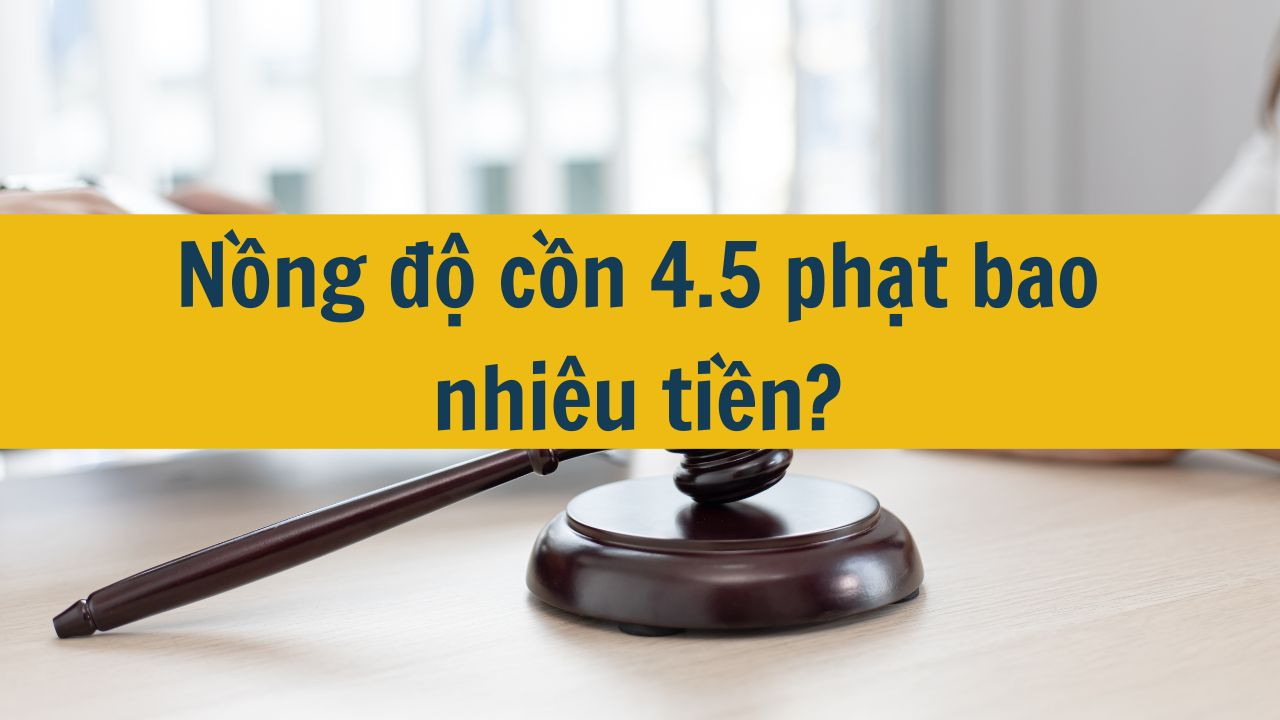
Nồng độ cồn 4.5 phạt bao nhiêu tiền mới nhất 2025?
Nồng độ cồn 4.5 là mức vi phạm phổ biến khi tham gia giao thông. Điều này không chỉ gây nguy hiểm cho bản thân và người khác mà còn bị xử lý nghiêm khắc theo quy định pháp luật. Vậy nồng độ cồn 4.5 sẽ bị phạt bao nhiêu tiền? Cùng tìm hiểu mức phạt và các quy định liên quan trong bài viết dưới đây để hiểu rõ hơn về quyền lợi và nghĩa vụ khi tham gia giao thông 21/01/2025Nồng độ cồn 0.47 phạt bao nhiêu tiền mới nhất 2025?
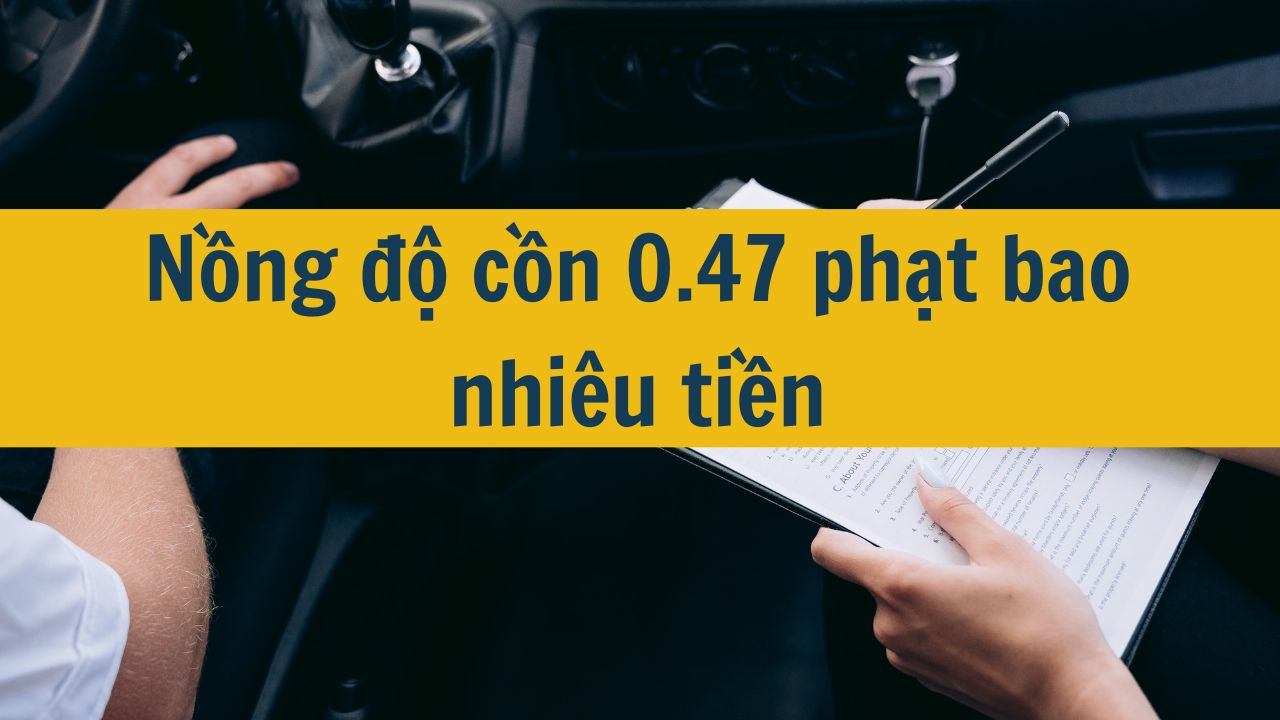
Nồng độ cồn 0.47 phạt bao nhiêu tiền mới nhất 2025?
Khi điều khiển phương tiện giao thông, nồng độ cồn vượt quá mức cho phép có thể gây ra hậu quả nghiêm trọng. Vậy nếu nồng độ cồn là 0.47, người vi phạm sẽ bị xử phạt như thế nào? Bài viết dưới đây sẽ giúp bạn hiểu rõ về mức phạt, quy định của pháp luật liên quan và cách thức xử lý đối với hành vi này. 21/01/2025Mức phạt nồng độ cồn xe máy dưới 0,4 mới nhất 2025
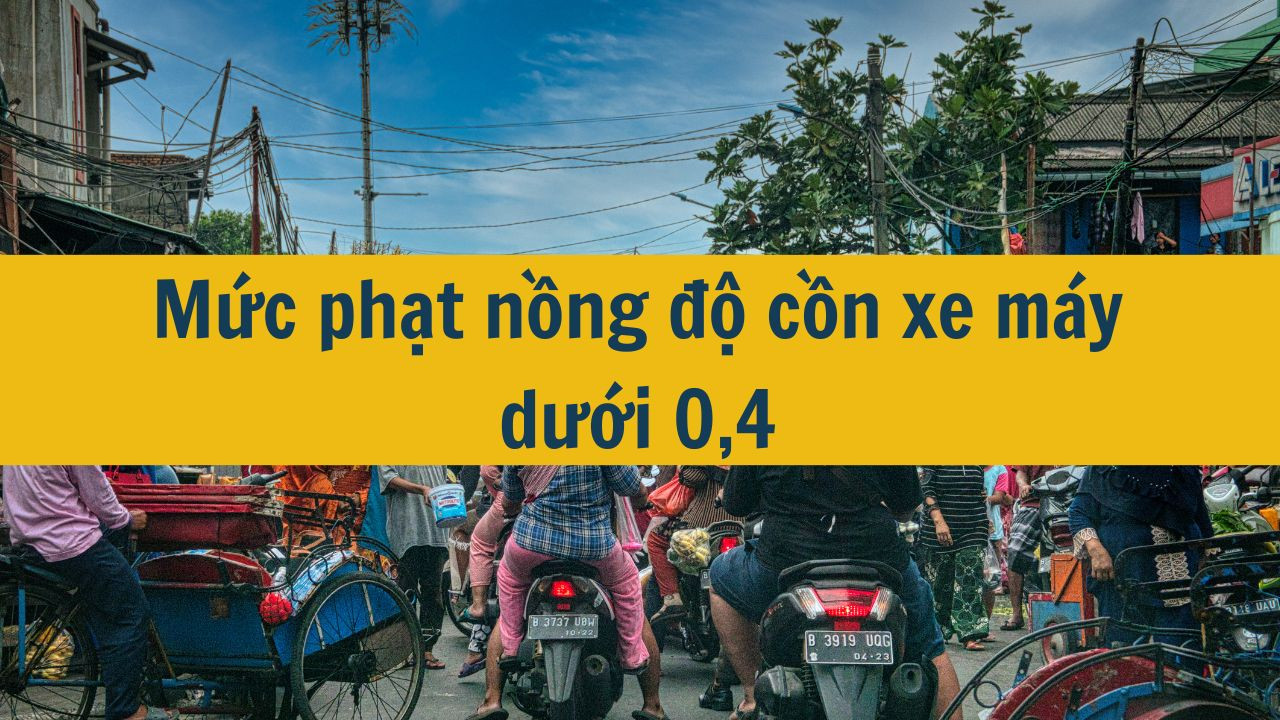

 Luật xử lý vi phạm hành chính 2012 (Bản Word)
Luật xử lý vi phạm hành chính 2012 (Bản Word)
 Luật xử lý vi phạm hành chính 2012 (Bản Pdf)
Luật xử lý vi phạm hành chính 2012 (Bản Pdf)